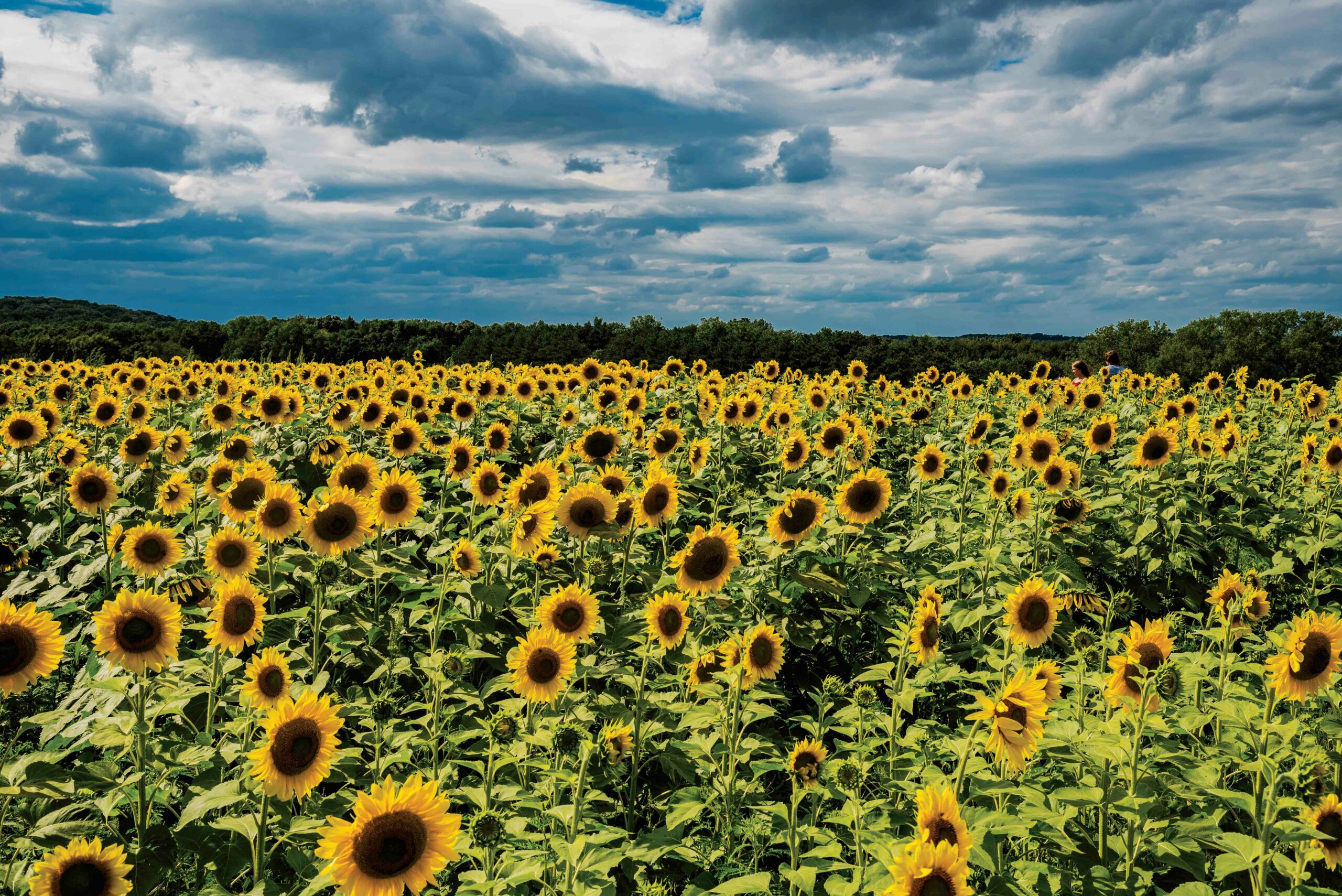
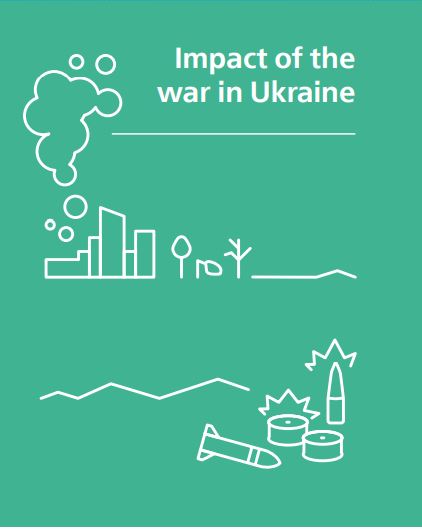
On 24 February 2022, Russia launched a large-scale military invasion of Ukraine. The unprovoked and unjustified military aggression against Ukraine has caused severe human and physical damage, also heavily targeting the civilian population and civilian infrastructure nationwide. To respond to the humanitarian emergency caused by the war, the EU4Climate has been repurposing part of the project’s budget towards emergency response and addressing the immediate needs of the war-distressed population, complementing EU humanitarian assistance։
 procurement of medical supplies to address the immediate needs of the Ukrainian population;
procurement of medical supplies to address the immediate needs of the Ukrainian population;
 provision of basic needs for internally displaced people staying in Ukraine’s national parks and other protected areas (with the engagement of the Frankfurt Zoological Society);
provision of basic needs for internally displaced people staying in Ukraine’s national parks and other protected areas (with the engagement of the Frankfurt Zoological Society);
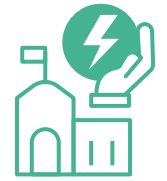 assisting in needs assessment of the impacted municipalities, purchasing and delivering equipment such as power generators for critical infrastructure, and providing training about the safe use of the generators for the representatives of impacted municipalities (in cooperation with the Association “Energy Efficient Cities of Ukraine”).
assisting in needs assessment of the impacted municipalities, purchasing and delivering equipment such as power generators for critical infrastructure, and providing training about the safe use of the generators for the representatives of impacted municipalities (in cooperation with the Association “Energy Efficient Cities of Ukraine”).
Ongoing and planned activities of the EU4Climate Ukraine are being implemented as conditions allow.

The war in Ukraine, in all its dimensions, is producing alarming cascading effects on a world economy already battered by COVID-19 and climate change, severely disrupting food, energy, and financial markets.
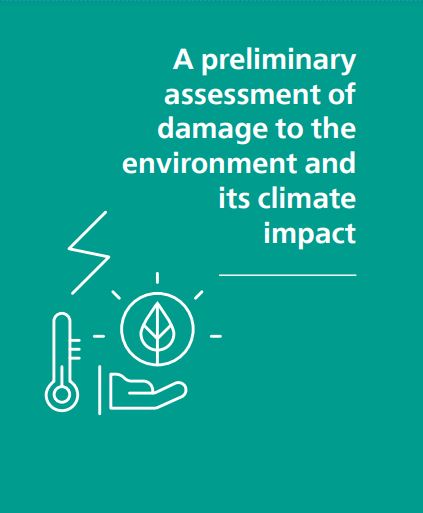
Some early assessments have already registered pollution incidents that place people and ecosystems at risk of acute and long-term harm. Ukraine will be facing huge environmental problems as the war is poisoning the nation’s air, water, and soil. These concern air pollution from military sites and materiel, including soil and water contamination, also coming from coal mines in the zone of conflict.
Besides recorded and future damage to the ecosystems, both the military build-up and impacts from the fighting will generate significant GHG emissions. Compared to 2021, the total area of forest fires in Ukraine increased 100 times, with most fires happening in the South and East of Ukraine. Additionally, to the serious biodiversity losses, destroyed forests and peatlands will largely impact the possibility a) to offset carbon emissions; and b) to increase adaptation capacity via nature-based solutions. Additional pressure is created by the occupation of Ukrainian sea ports by the Russian military, already causing serious concerns about the world’s food security and forcing Ukrainian authorities and the international community to seek alternative logistical solutions to deliver lifesaving food supplies to the most vulnerable countries, which will generate additional GHG emissions.
According to the latest calculations by the Ministry of Environment and international experts, as a result of the war in 2022 (covering the period of 24 February – 31 December 2022), at least 33 million tons of CO2 equivalent emissions were recorded. Of them:

from hostilities – about 8.9 million tons of CO2eq;

from the movement of internally displaced persons – about 1 million tons of CO2eq;

from fires – more than 23.4 million tons of CO2eq.
Potential indirect emissions of greenhouse gases due to the need for post-war reconstruction and reconstruction are estimated at 48.7 million tons of CO2eq.
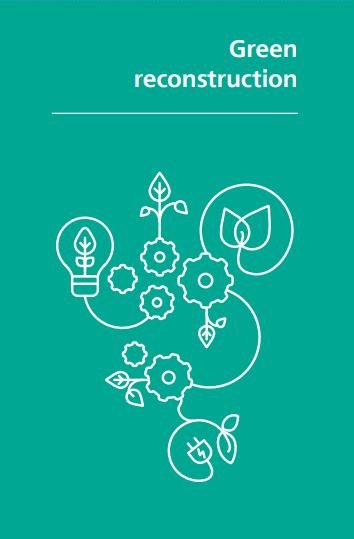
The post-war reconstruction of Ukraine should take into account the principles of building back better and green reconstruction from the outset. Ukraine applied for EU membership in February 2022 and was granted EU candidate Status in June 2022. Green Reconstruction and Ukraine’s path to EU membership will be mutually reinforcing processes. The impact of the war on Ukrainian society and economy has been severe, estimated reconstruction and recovery needs, as of February 24, 2023, are estimated at about US$411 billion according to the RDNA2, undertaken jointly by the World Bank, the Government of Ukraine, the European Commission, and the United Nations[1]. Integrated into these needs are critical steps toward becoming a modern, low-carbon, disaster- and climate-resilient country that has aligned with European Union policies and standards in view of being ready to join the European Union, and where the population’s vulnerabilities are addressed and people live in prosperity. While the financing envelope is overwhelming, experience from other countries shows that a phased approach to reconstruction is critical. Those figures are expected to further increase as the war continues.
Accelerating the pace of the green transition on the basis of EU standards and regulations is more important than ever to mitigate negative environmental and climate impacts and to ensure Ukraine rebuilds a sustainable, green, and just economy. At the same time, this will also accelerate the path of Ukraine towards EU membership. Initial steps towards post-war reconstruction have already been made by the government of Ukraine. To support the post-war reconstruction, the Commission has proposed to set up the ‘Rebuild Ukraine’ Facility which will be implemented through the ‘Ukraine reconstruction platform’, led by the Ukrainian government. The European Union stresses that the reconstruction should be in line with the European green and digital agenda.
Energy relations with Ukraine will remain focused on sustainable energy security and the green energy transition. Implementing reforms to enhance Ukraine’s resilience, energy security and green transition are closely linked to the European Union’s candidate status and, therefore, a priority.
[1] https://ukraine.un.org/en/224374-updated-ukraine-recovery-and-reconstruction-needs-assessment
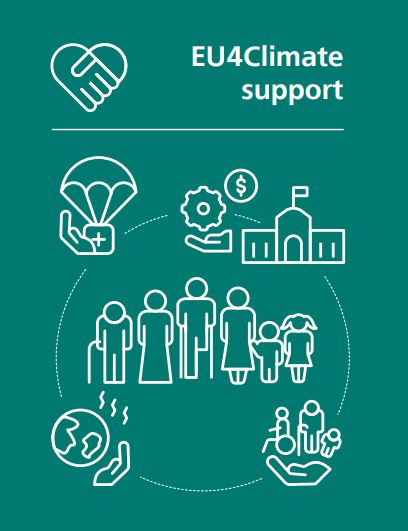
With EU4Climate support, policymaking and research will also contribute to building back Ukraine better, increasing its climate resilience, financing climate solutions and decreasing energy dependence on fossil fuels. Reconstruction of infrastructure and areas affected by hostilities should consider the restoration of the ecosystems’ adaptability to climate change. In this context, the Methodological Guidelines for Risk Assessment and Vulnerability to Climate Change, which are currently being developed, are of particular importance, as due to hostilities natural and natural-anthropogenic systems were heavily destabilized, significantly increasing their vulnerability to external influences, resilience, and ability to adapt to climate change. EU4Climate also develops a feasibility study on the potential of alternative fuel use in aviation and water transport. Refueling from sustainable and achievable sources is a major part of energy security, rebuilding the energy system in a green way and achieving the GHG emissions targets.
On 23 June 2022, the European Council adopted conclusions on the membership applications from Ukraine, the Republic of Moldova and Georgia and has decided to grant the status of candidate country to Ukraine and to the Republic of Moldova, also recognizing the European perspective of Georgia.

Climate policy development and advancing cooperation with the EU in Ukraine

-
 2014
2014
- Association Agreement with EU National Energy Efficiency Action Plan (NEEAP) (2015-2020)
 2015
2015
- INDC 2021-2030
- Paris Agreement
- Pledge to Sustainable Development
Agenda 2030 - National Renewable Energy Action Plan
till 2020
 2016
2016
- Ratification of Paris Agreement
- The Concept on State Policy on Climate Change till 2030
 2017
2017
- EU-Ukraine AA fully effective
- The Action Plan to Implement Concept on State Policy on Climate Change till 2030
- Energy Strategy of Ukraine (2035)
 2018
2018
- LEDS submitted (2021-2050)
- National Energy and Climate Plans
(NECPs) working group
 2019
2019
- EU4Climate launched
- Monitoring, Reporting and Verification(MRV) of GHG emissions Law adopted
- Law on Ozone-Depleting Substances and F-gases adopted
 2020
2020
- Secondary legislation on MRV implementation adopted
- Sublegal acts on Ozone-depleting substances and F-gases adopted
 2021
2021
- Updated NDC to Paris Agreement (2021-2030) approved
- National Energy and Climate Plan (NECP) (2021-2030) – under development
- Environmental Safety and Climate Change Adaptation Strategy by 2030 and Adaptation Action Plan
 2022
2022
- NDC Implementation Plan
- NDC Financial Strategy and Action Plan by 2030
- Methodological recommendations on sectoral climate risks and vulnerability assessment
- Recommendations and training on alternative fuels in avia and water transport
- Law on waste management updated
- Legislation on air emissions updated
 2023
2023
- Framework Climate Law of Ukraine – under development
- National reconstruction plan, including environment and climate elements – under development
- National Energy and Climate Plan update (NECP) 2021-2030 – under development
- Strategic Environmental Assessment of NECP update – under development
- National Adaptation Communication
EU4Climate key policy interventions and expected impact


Result areas and timeframe in Ukraine
|
RESULT AREAS |
2019 |
2020 |
2021 |
2022 |
|||||||||||
|
|
Q3 |
Q4 |
Q1 |
Q2 |
Q3 |
Q4 |
Q1 |
Q2 |
Q3 |
Q4 |
Q1 |
Q2 |
Q3 |
Q4 |
|
|
NDC |
|
|
|
|
|
|
|
|
|||||||
|
MRV System |
|
|
|
|
|
|
|
|
|
|
|
|
|
|
|
|
EU Climate Acquis |
|
|
|
|
|
|
|
|
|
|
|
|
|
||
|
Climate mainstreaming |
|
|
|
|
|
|
|
|
|
|
|
|
|
|
|
|
Climate investment |
|
|
|
|
|
|
|
|
|
|
|
|
|
|
|
|
Adaptation planning |
|
|
|
|
|
|
|
|
|
|
|
|
|
|
|
Result areas and timeframe in Ukraine
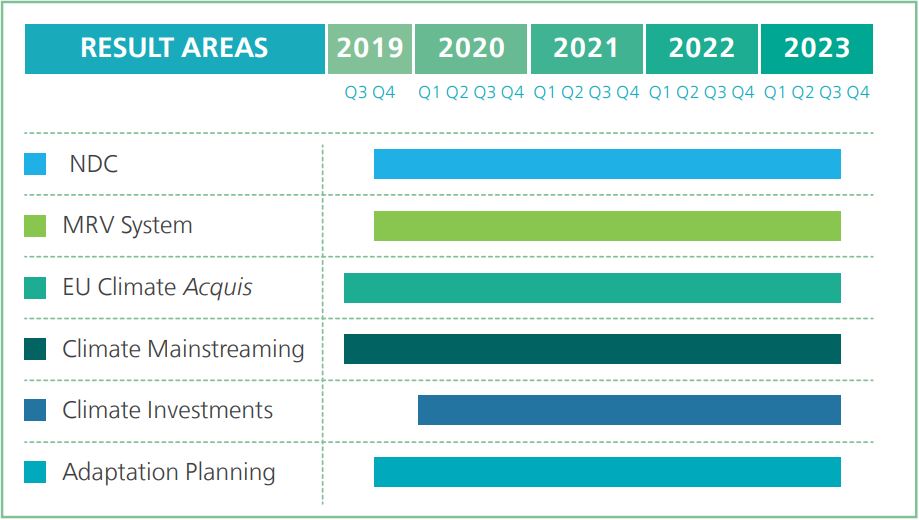
Full country profile can be downloaded here.



